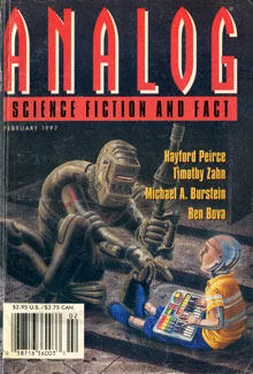David Phalen - Chasing the Idea Rat with My Best Friend, Jaime
Здесь есть возможность читать онлайн «David Phalen - Chasing the Idea Rat with My Best Friend, Jaime» весь текст электронной книги совершенно бесплатно (целиком полную версию без сокращений). В некоторых случаях можно слушать аудио, скачать через торрент в формате fb2 и присутствует краткое содержание. Год выпуска: 1997, Издательство: Dell Magazines, Жанр: Фантастика и фэнтези, на английском языке. Описание произведения, (предисловие) а так же отзывы посетителей доступны на портале библиотеки ЛибКат.
- Название:Chasing the Idea Rat with My Best Friend, Jaime
- Автор:
- Издательство:Dell Magazines
- Жанр:
- Год:1997
- ISBN:нет данных
- Рейтинг книги:3 / 5. Голосов: 1
-
Избранное:Добавить в избранное
- Отзывы:
-
Ваша оценка:
- 60
- 1
- 2
- 3
- 4
- 5
Chasing the Idea Rat with My Best Friend, Jaime: краткое содержание, описание и аннотация
Предлагаем к чтению аннотацию, описание, краткое содержание или предисловие (зависит от того, что написал сам автор книги «Chasing the Idea Rat with My Best Friend, Jaime»). Если вы не нашли необходимую информацию о книге — напишите в комментариях, мы постараемся отыскать её.
Chasing the Idea Rat with My Best Friend, Jaime — читать онлайн бесплатно полную книгу (весь текст) целиком
Ниже представлен текст книги, разбитый по страницам. Система сохранения места последней прочитанной страницы, позволяет с удобством читать онлайн бесплатно книгу «Chasing the Idea Rat with My Best Friend, Jaime», без необходимости каждый раз заново искать на чём Вы остановились. Поставьте закладку, и сможете в любой момент перейти на страницу, на которой закончили чтение.
Интервал:
Закладка:
“She used to carry for dealers, even though she hated pinchheads, despised them for not having control over something as basic as their own lives. She did anything to keep us fed, but she was always home with me at night. She used to call me her special night-time man.
“Usually, she came home with something canned. Sometimes she’d sucker someone too far gone out of a cut of fresh meat. I don’t remember ever being hungry while she was still around. One day, she dumped her bag, and a rat fell out on the floor. She had gotten it as payment from the pinchhead she delivered to. She was supposed to take it back to the dealer, but she brought it home for me instead.
“I had never seen a whole rat like that, before it was butchered. I started to cry, but my mother laughed and hugged me. She let me sit on her lap and touch it. Its fur was soft, oily; the skin on its tail and legs felt like a sidewalk.
“When I asked my mother about the funny mark on its foot, she started to shake. She counted toes. She put the rat back in her bag and got ready to leave again. She told me to be good while she was gone. Said she might be late, so I should put myself to bed that night. She kept apologizing for that, promising that when she came back for me our lives would be wonderful.”
The room was quiet again. The blackness reminded me of Jaime’s eyes. I heard the muffled sound of a bottle breaking somewhere above us.
“I stayed up as long as I could, but she didn’t come back. Next morning, I went to a neighbor who sometimes looked after me. She let me spend a few days; then she pawned me off on a friend of hers. I got passed around like that for a couple of months, until I realized I didn’t need them. I could find better food and better places to stay on my own. After that, I stayed alone. I tried a different school every year, figuring I’d eventually find one that could make me smart enough to come up with a plan.”
In the silence that followed, I waited for Jaime to say more, but I guess he figured I knew the rest of the story. He let me fill in the gaps in that dark coffin of a room.
Jaime puts the bag on the table and sits in a large, blue chair across from Calvin Natt. I sit down, too. Calvin Natt hasn’t stopped smiling since we walked through the door.
“We’ve got something you might want back,” says Jaime.
Calvin Natt raises an eyebrow, nods at the bag. “You’ve found an Idea Rat?”
“Yes, sir,” I tell him.
“Congratulations.” Natt says this as if mildly amused.
“We came to work a deal,” says Jaime.
Calvin Natt’s happy eyes stay on me. “What do you suppose one of those things is worth?”
“We want more than money,” Jaime says.
“I didn’t offer any money.”
I look at Jaime, wondering what he’s going to say next. He licks his lips with a slow, dry tongue and gives Calvin Natt a little smile of his own. Smiling is not something Jaime has practiced often. “Five years ago, a woman came in here.”
“Your mother,” says smiling Calvin Natt. “She’ll be happy to see you.”
Calvin Natt talks as he leads us through the endless expanse of building to Jaime’s mother.
“When we picked up that you were checking out Idea Rats on various network sources,” he tells us, “we sent someone to find your test scores. Outstanding. Unfortunately, by the time we got there, you were already gone. I’ve been trying to get the testing companies to waive the database fees for places like ICSS for years. That you two could exist right under our noses is just more proof that I’m right.”
I glance over at Jaime. He looks small in the huge, colorless corridors. The bag containing the Idea Rat swings at his thigh.
“Forget your research, by the way,” says Calvin Natt. “Forget what you think you know about me, even. Who I am depends on your domain extension. For city kids, I’m from the streets. In the suburbs, I’m a misunderstood genius runaway. Near the borders, I’m an illegal who made it good.”
“You never caught an Idea Rat?” I ask him.
Calvin Natt smiles and shakes his head. “Nobody catches an Idea Rat.”
“We did,” Jaime says. He clutches his durafab bag for reassurance. “My mom had one.”
“You caught a Bait Rat, genetically programmed as a sort of final test for potential candidates. Your mother was a fortunate accident. We were going for a dealer whose street-smart reputation intrigued us. I was more surprised than anyone when her scan turned up positive.”
We reach the end of the corridor, and Calvin Natt puts a security card into a slot. An elevator door opens and we walk inside. Calvin Natt puts his card into another slot and punches a button. A feeling of extra weight tells me we’re going up.
“The privatization of schools was supposed to make education more competitive, and thus more effective,” Calvin Natt continues. “It didn’t. The abolition of patent protection was misguidedly proposed as a way to achieve wider creativity. It wasn’t. We’re falling behind the world because we’ve stopped coming up with the breakthroughs, ideas that take a science or an industry ahead a couple of generations in one step. Ideas that come from geniuses. I.R.’s are NattCo’s unique solution to the genius problem.”
The elevator stops and the door opens into a small room. The wall across from us has another door, with a sign proclaiming “TOP SF.CURITY ACCESS ONLY!” in large, red letters. Calvin Natt puts his card in a slot and the door opens into a nondescript white corridor. The door closes behind us with a noise like air escaping from a tire.
“Twenty years ago, I was working for another company—mapping the human genome—when I found a unique sequence. Our map was effectively complete by that point. This sequence hadn ’t shown up in any of the millions already in Genbank, so I figured it was superfluous. Most of the DNA molecule is. Turns out this little sequence is transcribed just like a real gene, though we still don’t know how. On a lark, I did a run on some Stephen Hawking tissue and found the same sequence in the same spot. Just for fun, I ran a check through my famous people files. Einstein matched. Lenin came up negative. Watson was negative; Crick positive. Go figure.”
Calvin Natt opens a heavy door and we walk into a large laboratory. A woman in a pale blue lab coat is pulling a needle from the thigh of a man sitting in a metal chair. The man grimaces as the needle comes out.
“How’s it going, Mary?” Calvin Natt asks. “Bill?”
“Fine, Mr. Natt.” The woman takes the syringe over to a counter, turning her back to us. The man shrugs, grunting in a way that could mean anything.
“Idea Rats are created using a particular genius sponsor, like Bill,” Calvin Natt continues. “Mary isolates sequences and sends them down to embryology, where they will be spliced into the chromosomes of our Experience Animals. Are they doing hawks this week, Mary?”
“Dolphins, I think,” she says without turning from her work.
“We’ve got high hopes for dolphins,” Calvin Natt says as he leads us from the lab. “Most of the world is under water, after all.”
He leads us down the empty corridor. “When I first isolated the genius sequence, I tested thousands of people, myself included. I didn’t find a single match. I made a standard request for more funding to research the matter further. To my surprise, the company approved a study including all employees. It turned up one match, a janitor with a tested IQ at the lower end of average. I went to the chemical-psychology division, to a doctor working on the genius problem from a different angle. She could get her subjects to a certain level, but nobody ever went beyond a clear-cut upper limit. Within six months of running that janitor through her program, though, he came up with the groundwork for the entire I.R. concept.”
Читать дальшеИнтервал:
Закладка:
Похожие книги на «Chasing the Idea Rat with My Best Friend, Jaime»
Представляем Вашему вниманию похожие книги на «Chasing the Idea Rat with My Best Friend, Jaime» списком для выбора. Мы отобрали схожую по названию и смыслу литературу в надежде предоставить читателям больше вариантов отыскать новые, интересные, ещё непрочитанные произведения.
Обсуждение, отзывы о книге «Chasing the Idea Rat with My Best Friend, Jaime» и просто собственные мнения читателей. Оставьте ваши комментарии, напишите, что Вы думаете о произведении, его смысле или главных героях. Укажите что конкретно понравилось, а что нет, и почему Вы так считаете.












